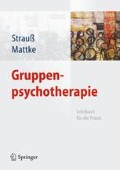Zusammenfassung
Traumatische Ereignisse haben für Betroffene häufig psychische und besonders auch psychosoziale Einschränkungen zur Folge. Betroffene, die infolge schrecklicher Lebensereignisse an einer posttraumatischen Belastungsstörung, depressiven Symptomen oder Ängsten leiden, können in einem gruppentherapeutischen Setting entlastende und unterstützende Begleitung erfahren. In diesem Kapitel werden einführend soziale Folgen der posttraumatischen Belastungsstörung dargelegt. Anschließend werden allgemeine Aspekte der Gruppentherapie bei posttraumatischen Störungen erläutert, wie Wirkfaktoren, wichtige Voraussetzungen, mögliche Kontraindikationen und allgemeine Rahmenbedingungen. Der Leser erhält zudem einen Überblick über einzelne gruppentherapeutische Manuale und Ansätze, die folgenden Bereichen zugeordnet werden können: (1) traumafokussierte, kognitiv-behaviorale Gruppentherapie, (2) Skillstraining und Emotionsregulation, (3) psychoedukative Ansätze.
Access this chapter
Tax calculation will be finalised at checkout
Purchases are for personal use only
Literatur
Beck, J. G., & Coffey, S. F. (2005). Group cognitive behavioral treatment for PTSD: Treatment of motor vehicle accident survivors. Cognitive and Behavioral Practice, 12 , 267–277.
Beck, J. G., Coffey, S. F., Foy, D. W., Keane, T. M., & Blanchard, E. B. (2009). Group cognitive behavior therapy for chronic posttraumatic stress disorder: An initial randomized pilot study. Behavior Therapy, 40 , 82–92.
Blanchard, E. B., & Hickling, E. J. (2004). After the crash. Washington, DC: American Psychological Association.
Blanchard, E. B., Hickling, E. J., Devineni, T., Veazey, C. H., Galovski, T. E., Mundy, E., Malta, S. L., & Buckley, T. C. (2003). A controlled evaluation of cognitive behavioural therapy for posttraumatic stress in motor vehicle accident survivors. Behaviour Research & Therapy, 41, 79–96.
Campanini, R. F., Schoedl, A. F., Pupo, M. C., Costa, A. C., Krupnick, J. L., & Mello, M. F. (2010). Efficacy of interpersonal therapy-group format adapted to post-traumatic stress disorder: An open-label add-on trial. Depression and Anxiety, 27(1), 72–77.
Fallot, R. D., & Harris, M. (2002). The trauma recovery and empowerment model (TREM): Conceptual and practical issues in a group intervention for women. Community Mental Health Journal, 28(6), 475–485.
Foy, D. W., & Schrock, D. A. (2006). Future directions. In L. A. Schein, H. I. Spitz, G. M. Burlingame & P. R. Muskin (Hrsg.), Psychological effects of catasthrophic disasters: Group approaches to treatment . New York: Haworth Press.
Knaevelsrud, C., & Maercker, A. (2008). Die therapeutische Beziehung mit Traumatisierten. In M. Hermer & B. Röhrle (Hrsg.), Handbuch der therapeutischen Beziehung . Tübingen: dgvt.
Liedl, A., Schäfer, U., & Knaevelsrud, C. (2010). Psychoedukation bei posttraumatischen Störungen – Manual für Einzel- und Gruppensetting . Stuttgart: Schattauer.
Lorenz, A. R., Ready, D. J., Worley, V. M., Baltzell, D., Mozley III, T. N., & Brown-Thomas, K. (2006). Group-based exposure therapy (GBET): The Atlanta model for combat veterans with PTBS. Atlanta: Decatur, GA: Department of Veterans Affairs Medical Center.
Lubin, H., & Johnson, D. R. (1997). Interactive psychoeducational group therapy for traumatized women. International Journal of Group Psychotherapy, 47, 271–290.
Lubin, H., Loris, M., Burt, J., & Johnson, D. R. (1998). Efficacy of psychoeducational group therapy in reducing symptoms of posttraumatic stress disorder among multiply traumatized women. American Journal of Psychiatry, 155, 1172–1177.
Maccoll, G. J. (2007). A 9/11 parent support group. International Journal of Group Psychotherapy, 57, 347–366.
Maercker, A., & Schützwohl, M. (1999). Langzeitfolgen politischer Inhaftierung. Eine Kontrollgruppenstudie. In U. Walter, H. Krappweis & J. Räbiger (Hrsg.), Public-Health-Forschung in Deutschland (S. 82–87). Bern: Huber.
Maercker, A., Zöllner, T., Menning, H., Rabe, S., & Karl, A. (2006). Dresden PTSD treatment study: Randomized controlled trial of motor vehicle accident survivors. BMC Psychiatry, 6 , 6–29.
Mendelsohn, M., Zachary, R., & Harney, P. (2007). Group therapy as an ecological bridge to a new community. Journal of Aggression, Maltreatment and Trauma, 14 , 227–243.
Moller, M. D., & Rice, M. J. (2006). The BE SMART trauma reframing psychoeducation program. Archives of Psychiatric Nursing, 20, 21–31.
Nietlisbach, G., & Maercker, A. (2009). Effects of social exclusion in trauma survivors with posttraumatic stress disorder. Psychological Trauma, 1, 323–331.
Olatunji, B. O., Cisler, J. M., & Tolin, D. F. (2007). Quality of life in the anxiety disorders: A meta-analytic review. Clinical Psychology Review, 27, 572–581.
Ozer, E. J., Best, S. R., Lipsey, T. L., & Weiss, D. S. (2003). Predictors of posttraumatic stress disorder and symptoms in adults: A meta-analysis. Psychological Bulletin, 129, 52–73.
Ready, D. J., Thomas, K. R., Worley, V., Backscheider, A. G., Harvey, L. A. C., Baltzell, D., et al. (2008). A field test of group based exposure therapy with 102 veterans with war-related posttraumatic stress disorder. Journal of Traumatic Stress, 21(2), 150–157.
Resick, P. A., & Schnicke, M. K. (1992). Cognitive processing therapy for sexual assault victims. Journal of Consulting and Clinical Psychology, 60, 748–756.
Resick, P. A., & Schnicke, M. K. (1993). Cognitive processing therapy for sexual assault victims: A treatment manual . Newbury Park, CA: Sage.
Schnurr, P. P., Friedman, M. J., Foy, D. W., Shea, M. T., Hsieh, F. Y., Lavori, P. W., Glynn, S. M., Wattenberg, M., & Bernardy, N. C. (2003). Randomized trial of trauma-focused group therapy for posttraumatic stress disorder – Results from a Department of Veterans Affairs Cooperative Study. Archives of General Psychiatry, 60, 481–489.
Wise, K. (2002). Clinical experience with a group therapy program for treating sexually abused and traumatized patients. Verhaltenstherapie, 12(2), 133–142.
Zlotnick, C., Shea, T. M., Rosen, K., Simpson, E., Mulrenin, K., Begin, A., & Pearlstein, T. (1997). An affect-management group for women with posttraumatic stress disorder and histories of childhood sexual abuse. Journal of Traumatic Stress, 10, 425–436.
Author information
Authors and Affiliations
Editor information
Editors and Affiliations
Rights and permissions
Copyright information
© 2012 Springer-Verlag Berlin Heidelberg
About this chapter
Cite this chapter
Knaevelsrud, C., Liedl, A., Maercker, A. (2012). Gruppentherapie bei Traumafolgestörungen. In: Strauß, B., Mattke, D. (eds) Gruppenpsychotherapie. Springer, Berlin, Heidelberg. https://doi.org/10.1007/978-3-642-03497-8_25
Download citation
DOI: https://doi.org/10.1007/978-3-642-03497-8_25
Publisher Name: Springer, Berlin, Heidelberg
Print ISBN: 978-3-642-03496-1
Online ISBN: 978-3-642-03497-8
eBook Packages: Humanities, Social Science (German Language)

